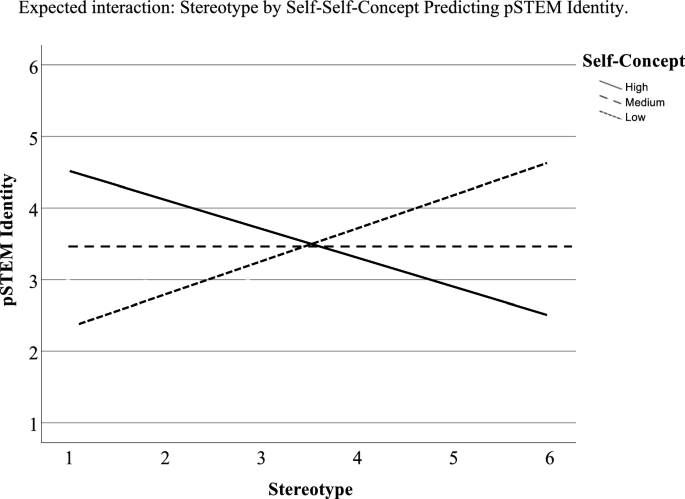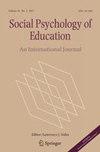那不是我:(不)系统系统书呆子天才的刻板印象和自我概念之间的不一致预测了高中生的系统系统身份
IF 3.2
2区 心理学
Q1 PSYCHOLOGY, EDUCATIONAL
引用次数: 0
摘要
人们对物理科学、技术、工程和数学(pSTEM)领域的书呆子天才的刻板印象阻碍了许多青春期女孩对pSTEM产生兴趣。赞同这些刻板印象可能会破坏青少年的系统认同,尤其是当他们与自己的自我概念不一致时——女孩可能比男孩更容易这样做。相反,当刻板印象一致时,系统认同可能会加强——男孩可能比女孩更多。我们在310名青少年中测试了这些假设。该研究的新颖贡献包括单独评估青少年对系统中的四种刻板印象(天才、笨拙、不吸引人、约会失败)的认可,以及单独考虑每个刻板印象领域中自我概念的两个方面(能力和重要性)。因素分析证实了自我概念的四因素结构,但表明刻板印象的两因素结构(书呆子[笨拙的,没有吸引力的,约会失败的]和天才)。学生的系统认同是基于他们与系统领域的人的感觉典型性。我们的研究结果基本上证实了我们对自我感知能力的假设模型,但对重要性的假设模型却不成立。同余预测更高的系统同一性。相反,不一致预示着较低的系统同一性。本文章由计算机程序翻译,如有差异,请以英文原文为准。

That’s not me: (Dis)concordance between pSTEM nerd-genius stereotypes and self-concepts predicts high school students pSTEM identity
Abstract Nerd-genius stereotypes about people in the physical sciences, technology, engineering, and mathematics (pSTEM) are barriers to getting many adolescent girls interested in pSTEM. Endorsing these stereotypes may undermine youths’ pSTEM identity especially when they are incongruent with their self-concepts—possibly more likely for girls than boys. Conversely, pSTEM identity may strengthen when stereotypes are congruent—possibly more for boys than girls. We tested these premises among 310 adolescents. Novel contributions of the study include the separate evaluation of youths’ endorsement of four stereotypes about persons in pSTEM (geniuses, awkward, unattractive, unsuccessful at dating) and the separate consideration of two facets of self-concepts (competence and importance) in each stereotyped domain. Factor analyses confirmed the four-factor structure for self-concepts but indicated a two-factor structure for stereotypes (nerd [awkward, unattractive, unsuccessful at dating] and genius). Students’ pSTEM identity was based on their felt typicality with persons in pSTEM fields. Our results generally confirmed our hypothesized model for self-perceived competence but not for importance. Congruence predicted higher pSTEM identity. Conversely, incongruence predicted lower pSTEM identity.
求助全文
通过发布文献求助,成功后即可免费获取论文全文。
去求助
来源期刊

Social Psychology of Education
PSYCHOLOGY, EDUCATIONAL-
CiteScore
5.40
自引率
3.40%
发文量
59
期刊介绍:
The field of social psychology spans the boundary between the disciplines of psychology and sociology and has traditionally been associated with empirical research. Many studies of human behaviour in education are conducted by persons who identify with social psychology or whose work falls into the social psychological ambit. Several textbooks have been published and a variety of courses are being offered on the `social psychology of education'', but no journal has hitherto appeared to cover the field. Social Psychology of Education fills this gap, covering a wide variety of content concerns, theoretical interests and research methods, among which are: Content concerns: classroom instruction decision making in education educational innovation concerns for gender, race, ethnicity and social class knowledge creation, transmission and effects leadership in schools and school systems long-term effects of instructional processes micropolitics of schools student cultures and interactions teacher recruitment and careers teacher- student relations Theoretical interests: achievement motivation attitude theory attribution theory conflict management and the learning of pro-social behaviour cultural and social capital discourse analysis group dynamics role theory social exchange theory social transition social learning theory status attainment symbolic interaction the study of organisations Research methods: comparative research experiments formal observations historical studies literature reviews panel studies qualitative methods sample surveys For social psychologists with a special interest in educational matters, educational researchers with a social psychological approach.
 求助内容:
求助内容: 应助结果提醒方式:
应助结果提醒方式:


